
Faith at the Core, Excellence in Every Step
The Global Fashion Halal Standard (GFHS) is a comprehensive framework designed to ensure that fashion products adhere to the highest principles of halal compliance, sustainability, and ethical practices. GFHS serves as a guide for brands, manufacturers, and suppliers to create products that align with Islamic values and modern consumer expectations
- The Standard
The Global Fashion Halal Standard (GFHS) and our initiatives span a wide range of industries within the fashion ecosystem. From raw material sourcing to final retail, we engage key sectors to ensure a fully halal and sustainable supply chain
- Global fashion Halal Standard
CHEMICALS
The Global Fashion Halal Standard (GFHS) for Chemicals provides a comprehensive framework to evaluate, certify, and promote halal-compliant chemical products used across the fashion industry. This standard is specifically designed for manufacturers and distributors of chemicals utilized in the textile, leather, and footwear industries.
Ensuring Halal and Sustainability in Chemical Manufacturing
Chemicals play a pivotal role in the fashion industry, from dyeing and finishing to maintaining fabric quality. However, not all chemicals meet halal and ethical standards. The Global Fashion Halal Standard (GFHS) ensures that every chemical used in the fashion supply chain is free from haram (forbidden) substances, safe for the environment, and aligned with Islamic principles.
Chemicals, colorants, and auxiliaries certified under the GFHS for Chemicals standard undergo rigorous testing and analysis to ensure compliance with Islamic principles. By adopting halal chemistry, your company not only meets halal requirements but also contributes to the creation of cleaner and safer textiles, leather products, and footwear.
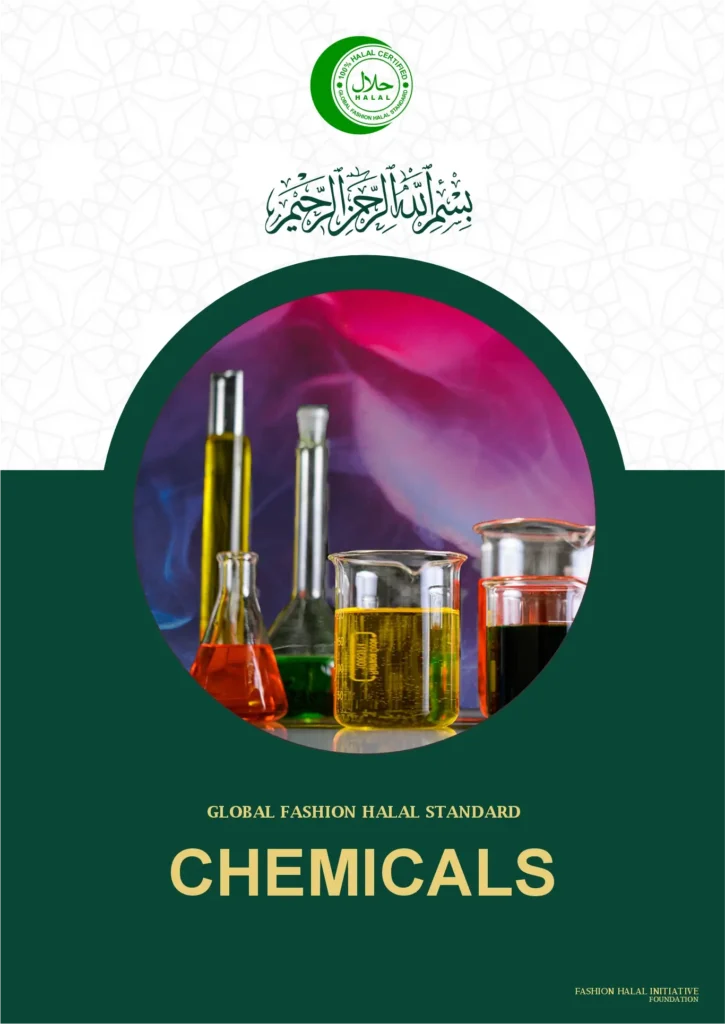
The GFHS framework includes:
- Dyes and pigments
- Fabric finishing agents
- Printing chemicals
- Detergents and softeners
- Coatings and adhesives
- Dye and pigment manufacturers
- Textile chemical suppliers
- Finishing agents and softener producers
Certified products are tested and analyzed against strict criteria that align with Islamic principles. These evaluations include ingredient traceability, testing for haram substances, and compliance with environmental and halal standards.
The certification process involves:
- Reviewing your product composition.
- Auditing your manufacturing processes for compliance with halal and ethical standards.
- Providing alternative solutions for any non-compliant materials.
- Receiving certification upon meeting the criteria.
[Start Your Certification Journey →]
- Global fashion Halal Standard
FIBRE
The Global Fashion Halal Standard (GFHS) for Fibre sets strict guidelines to evaluate and certify fibres used in the fashion industry, ensuring they comply with halal principles and align with sustainable and ethical practices. This standard is designed for manufacturers and suppliers of natural, synthetic, and regenerated fibres used across fashion industry in textiles, leather, and apparel.
Empowering the Fashion Industry with Halal-Compliant Fibres
Fibres are the foundation of the fashion industry, serving as the building blocks for textiles and garments. Their quality, origin, and processing methods play a critical role in shaping the final product and its compliance with halal principles.
The GFHS for Fibre certification ensures that fibres, whether natural or synthetic, meet the highest standards of halal compliance, sustainability, and quality. By adhering to these principles, fibre manufacturers and suppliers contribute to the production of textiles and fashion products that are cleaner, safer, and fully aligned with Islamic law
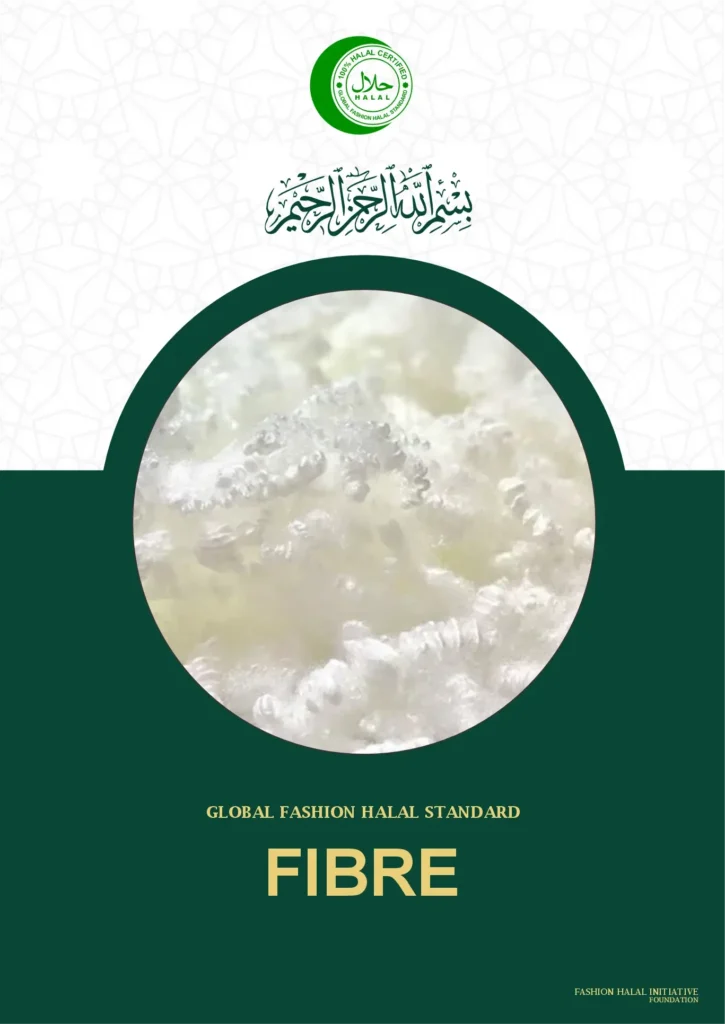
The GFHS framework includes:
- Natural fibres: Cotton, wool, silk, and others derived from halal and ethical sources.
- Synthetic fibres: Polyester, nylon, and other man-made fibres.
- Regenerated fibres: Viscose, lyocell, and other cellulose-based materials.
Man made fibre will be impacted against this included
1. Natural Polymer fibre
2. Synthetic Polymer fibre
Certified products are tested and analyzed against strict criteria that align with Islamic principles. These evaluations include raw material involved in production, and compliance with environmental and halal standards.
The certification process involves:
- Reviewing your product composition.
- Auditing your manufacturing processes for compliance with halal assurance system.
- Providing alternative solutions for any non-compliant materials.
- Receiving certification upon meeting the criteria.
[Start Your Certification Journey →]
- Global fashion Halal Standard
Yarn
The Global Fashion Halal Standard (GFHS) for Yarn provides a comprehensive framework to evaluate and certify yarns used in the textile and fashion industries. This standard ensures that yarns comply with halal principles and promote ethical, sustainable practices, creating a robust foundation for producing halal-compliant and environmentally responsible fashion products.
Spinning the Future of Halal and Sustainable Fashion
Yarn plays a crucial role in the fashion industry as the connecting thread between fibres and finished fabrics. Its composition, quality, and production process significantly impact the final product and its compliance with halal and ethical standards.
The GFHS for Yarn certification ensures that yarns meet rigorous halal standards while promoting sustainable and ethical production practices. By adhering to these principles, yarn manufacturers and suppliers contribute to the integrity and transparency of the global halal fashion supply chain.
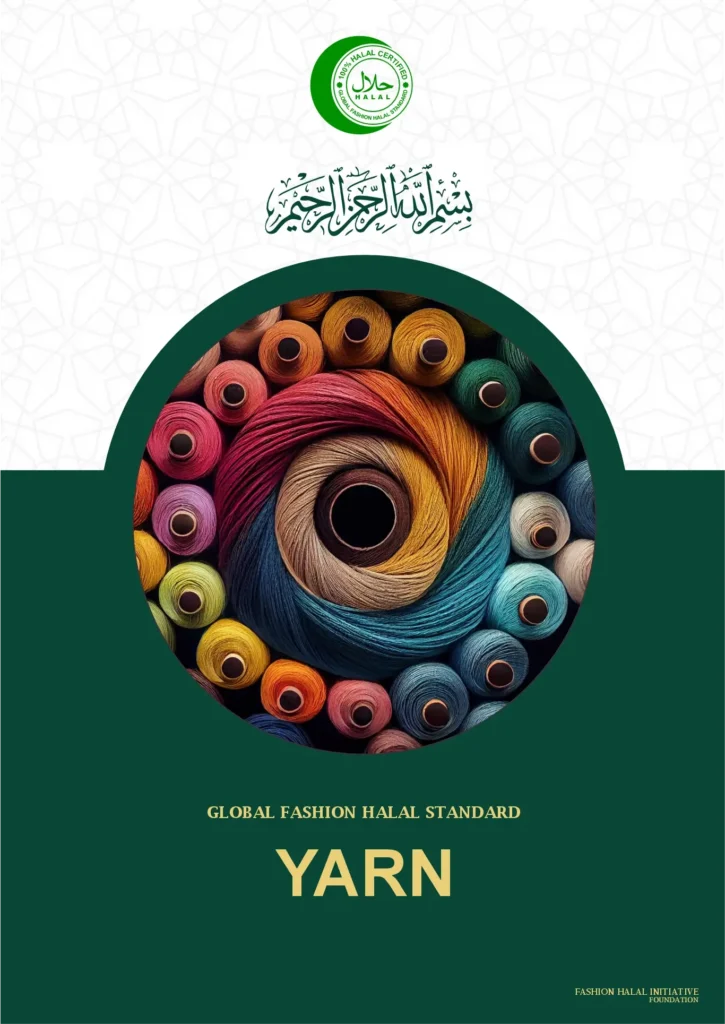
Types of Yarns:
- Natural yarns: Cotton, wool, silk, and other halal-certified fibres.
- Synthetic yarns: Polyester, nylon, and other man-made materials.
- Blended yarns: Combinations of natural and synthetic fibre
- Dye and pigment manufacturers
- Textile chemical suppliers
- Finishing agents and softener producers
Yarns are evaluated through:
- Verification of raw fibre sources for halal compliance.
- Ensuring no haram substances (e.g., animal derivativesl) are used during spinning and processing.
- Avoiding cross-contamination during production.
- Submit yarn details, including fibre composition and production processes.
- Undergo an evaluation to ensure halal compliance and sustainability.
- Make necessary adjustments to meet GFHS criteria, if required.
- Receive certification for compliant yarns, allowing access to halal-focused markets.
- Global fashion Halal Standard
Fabric
The Global Fashion Halal Standard (GFHS) for Fabric is specifically developed for manufacturers and suppliers of fabrics used in the textile, leather, and fashion industries. This certification ensures that fabrics meet strict halal compliance requirements while adhering to islamic principle
Revolutionizing Fabric Standards for Halal and Ethical Fashion
The Global Fashion Halal Standard (GFHS) for Fabric provides a comprehensive framework for evaluating and certifying fabrics used in the fashion industry. This standard ensures that fabrics are free from haram (forbidden) substances, produced ethically, and align with Islamic principles and sustainable practices. The GFHS for Fabric certification ensures that textiles meet strict halal compliance standards while prioritizing ethical and sustainable production practices. By achieving GFHS certification, fabric manufacturers and suppliers contribute to a transparent and trustworthy fashion supply chain.
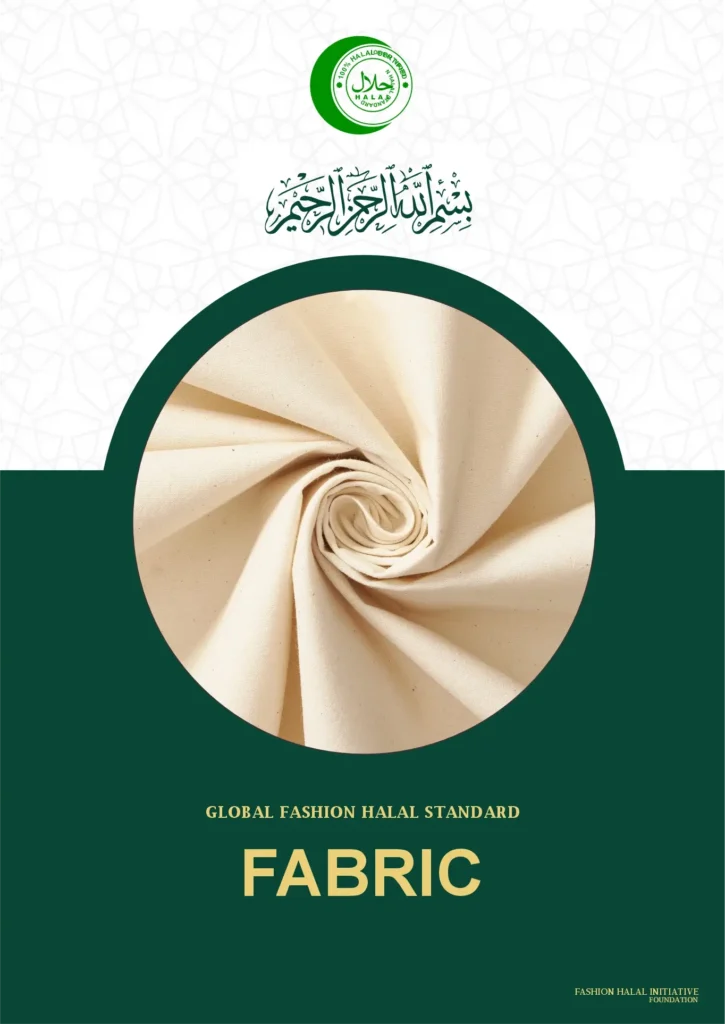
Types of Fabrics:
- Woven fabrics: Denim, twill, satin, and more.
- Knit fabrics: Jersey, rib, and interlock.
- Knitting manufacturers
- Woven Manufacturer
- Dyeing & Finishing Manufacturer
- Printing manufacturer
Fabrics are assessed for compliance through:
- Verification of raw materials, including fibres and yarns, to ensure halal origins.
- Testing of dyes, finishes, and other chemicals to eliminate haram substances.
- Monitoring production processes to prevent contamination at all stages.
The certification process involves:
- Reviewing your product composition.
- Auditing your manufacturing processes for compliance with halal and ethical standards.
- Providing alternative solutions for any non-compliant materials.
- Receiving certification upon meeting the criteria.
[Start Your Certification Journey →]
- Global fashion Halal Standard
Non Woven
The Global Fashion Halal Standard (GFHS) for Non-Woven provides a robust framework to ensure that non-woven materials meet halal principles, ethical guidelines, and sustainability requirements. This standard is specifically designed for manufacturers and suppliers of non-woven fabrics used in fashion, technical applications, and beyond.
Revolutionizing Non-Woven Fabrics with Halal Standards
Non-woven fabrics are versatile materials that serve various purposes in the fashion and textile industries. They play a significant role due to their unique properties and applications. The GFHS for Non-Woven Fabrics certification ensures that these materials are produced without haram substances and with environmentally responsible methods. By meeting the GFHS standards, manufacturers and suppliers can guarantee their products align with Islamic principles and global sustainability trends.
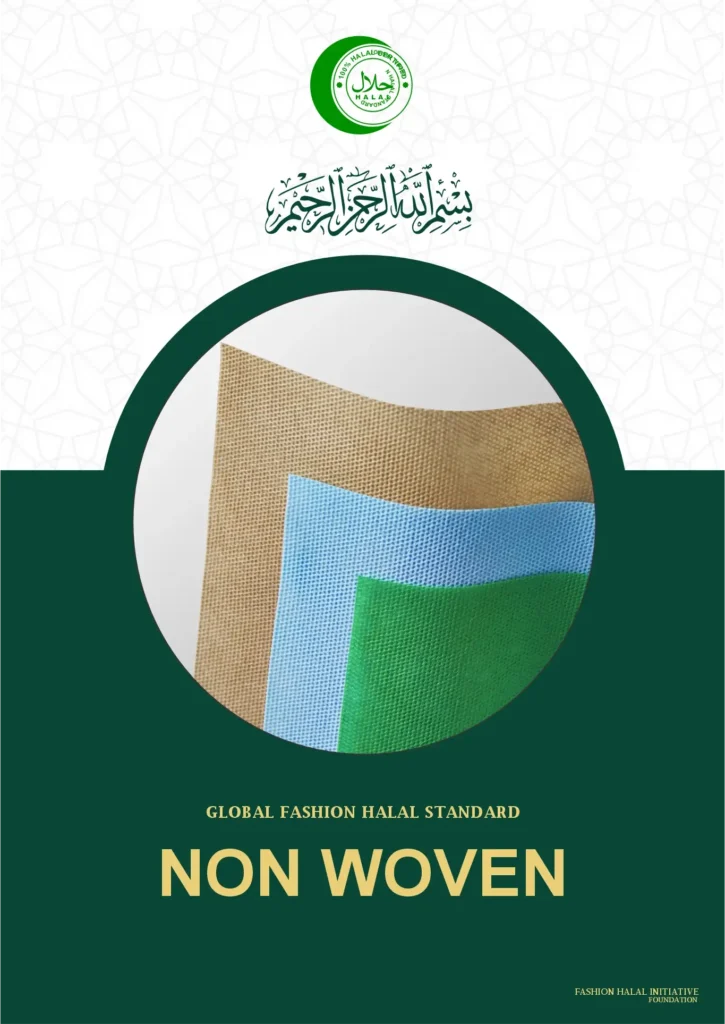
The GFHS framework includes:
Types of Non-Woven Fabrics:
- Spunbond
- Meltblown
- Needle-punched
- Hydroentangled (spunlace)
Non-Wovens impacts the following industries:
- Fashion and Apparel
- Footwear and Leather Goods
- Medical and Healthcare
- Home and Interior
- Hygiene Products
- Personal Care and Cosmetics
Non-woven fabrics are evaluated through:
- Verification of raw materials, such as fibres and adhesives, to ensure halal origins.
- Testing bonding methods (e.g., thermal, chemical, or mechanical) for compliance with Islamic principles.
- Avoiding contamination during production, storage, and transportation.
The certification process involves:
- Reviewing your product composition.
- Auditing your manufacturing processes for compliance with halal and ethical standards.
- Providing alternative solutions for any non-compliant materials.
- Receiving certification upon meeting the criteria.
[Start Your Certification Journey →]
- Global fashion Halal Standard
Leather
The Global Fashion Halal Standard (GFHS) for Leather establishes comprehensive guidelines to evaluate and certify leather used across the fashion industry. It ensures that leather is sourced, processed, and finished in adherence to halal principles while promoting ethical and sustainable practices.
Revolutionizing Leather for Halal-Compliant Fashion
Leather is a cornerstone material in the fashion industry, known for its durability, versatility, and timeless appeal. Its sourcing and processing methods directly influence its compliance with halal principles and ethical standards. The GFHS for Leather certification ensures that leather products meet rigorous halal standards while adhering to sustainable and ethical practices. Certified leather guarantees that every stage of the production process aligns with Islamic principles, from sourcing to finishing.
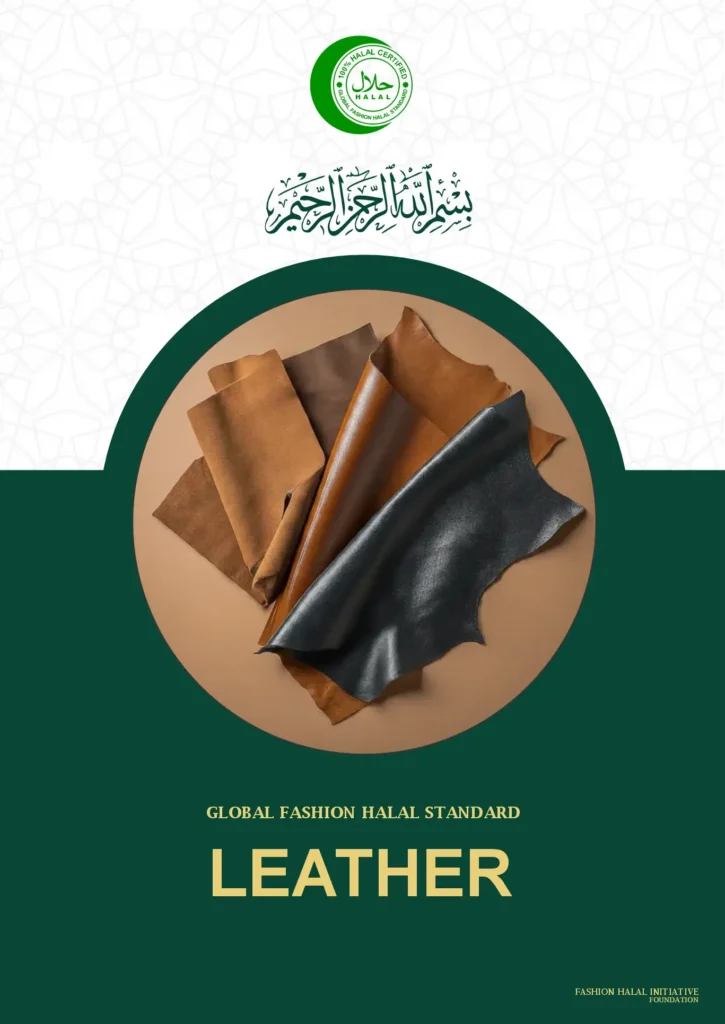
Types of Leather:
- Natural leather: Cow, sheep, goat, and other halal-permissible animal hides.
- Synthetic leather: Vegan and eco-friendly alternatives.
- Dye and pigment manufacturers
- Textile chemical suppliers
- Finishing agents and softener producers
Certified products are tested and analyzed against strict criteria that align with Islamic principles. These evaluations include ingredient traceability, testing for haram substances, and compliance with environmental and halal standards.
The certification process involves:
- Reviewing your product composition.
- Auditing your manufacturing processes for compliance with halal and ethical standards.
- Providing alternative solutions for any non-compliant materials.
- Receiving certification upon meeting the criteria.
[Start Your Certification Journey →]
- Global fashion Halal Standard
Sewing Manufacturer
The Global Fashion Halal Standard (GFHS) for Garment Manufacturers provides a structured framework to ensure that the entire garment production process adheres to halal principles, ethical practices, and sustainable standards. This certification is designed to help garment manufacturers produce high-quality, halal-compliant products that meet consumer demand and align with global regulations.
Empowering Manufacturers to Deliver Halal-Compliant
Sewing manufacturers are the backbone of the fashion supply chain, responsible for transforming raw materials into finished apparel. Their operations significantly impact the quality, sustainability, and halal compliance of fashion products. Sewing manufacturers determine the craftsmanship, durability, and appeal of fashion products. The GFHS for Sewing Manufacturers ensures that all aspects of production, from material sourcing to final assembly, comply with halal principles and promote sustainability. By achieving this certification, manufacturers can position themselves as leaders in ethical and halal-compliant garment production.
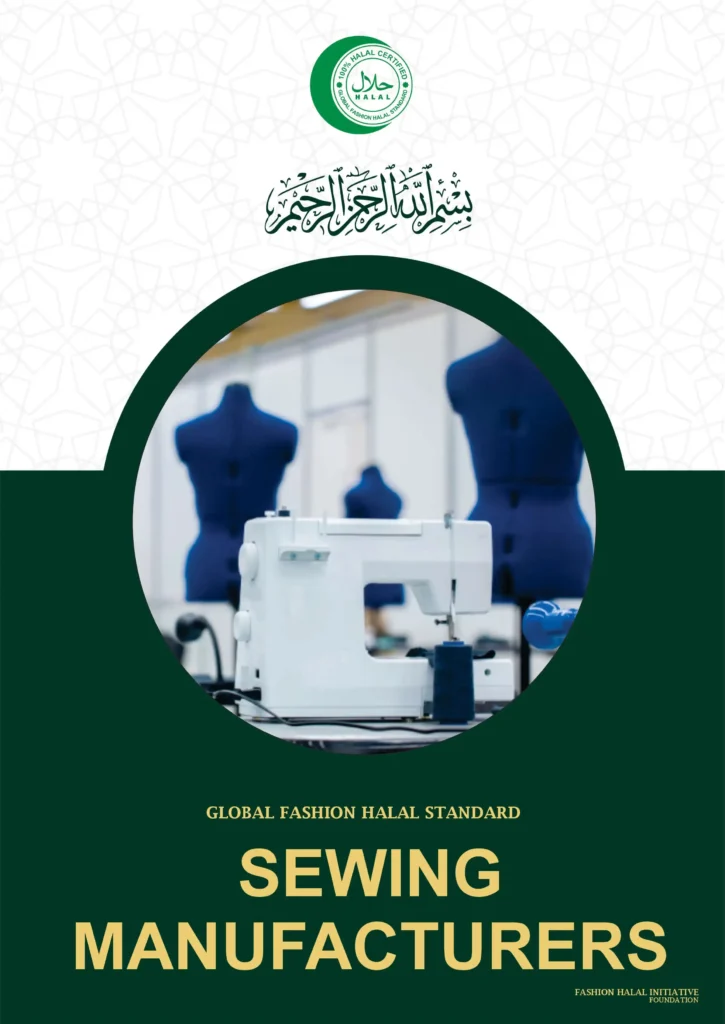
GFHS Certification Covers:
Key Production Stages:
1. Cutting, stitching, and assembling garments using halal-compliant materials.
2. Halal Assurance System
- Industries Impacted by Halal Garment Manufacturing
1. Ready-to-Wear Fashion
2. Modest Fashion and Islamic Wear
3. Uniform and Workwear
4. Footwear
5. Fashion Accories
6.Sportswear and Activewear
7. Luxury and Designer Fashion
The certification process involves:
- Assessing raw materials and components for halal compliance.
- Evaluating production processes to eliminate contamination with haram substances.
- Verifying the use of halal-certified chemicals and dyes in garment finishing.
- Monitoring packaging and labeling for compliance with halal standards.
The certification process involves:
- Reviewing your product composition.
- Auditing your manufacturing processes for compliance with halal and ethical standards.
- Providing alternative solutions for any non-compliant materials.
- Receiving certification upon meeting the criteria.
[Start Your Certification Journey →]
- Global fashion Halal Standard
Accecories
The Global Fashion Halal Standard (GFHS) for Fashion Accessories provides a comprehensive framework to evaluate, certify, and promote halal-compliant Fashion Accessories Materials used across the fashion industry. This standard is specifically designed for manufacturers and distributors of Fashion Accessories Materials utilized in the textile, leather, and footwear industries.
Revolutionizing Accessory Materials with Halal Standards
The Global Fashion Halal Standard (GFHS) for Fashion Accessories Materials establishes a comprehensive framework to evaluate, certify, and promote halal-compliant materials used in the creation of fashion accessories.
Fashion accessories play a crucial role in the industry, combining functionality and aesthetics to complete an outfit. Materials form the foundation of these accessories, determining their quality, durability, and appeal. With GFHS certification, manufacturers and brands can confidently cater to halal-conscious consumers by offering products that are free from haram (forbidden) substances, ethically sourced, and produced responsibly, ensuring both trust and market differentiation.
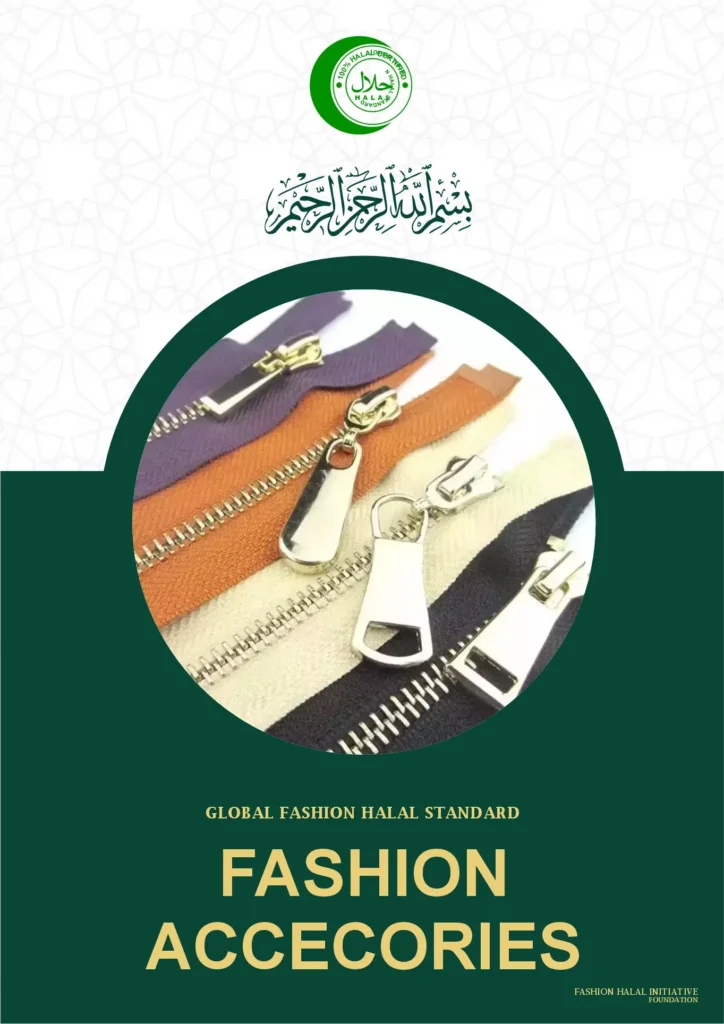
The GFHS framework includes:
- Dye and pigment manufacturers
- Textile chemical suppliers
- Finishing agents and softener producers
Certified products are tested and analyzed against strict criteria that align with Islamic principles. These evaluations include ingredient traceability, testing for haram substances, and compliance with environmental and halal standards.
The certification process involves:
- Reviewing your product composition.
- Auditing your manufacturing processes for compliance with halal and ethical standards.
- Providing alternative solutions for any non-compliant materials.
- Receiving certification upon meeting the criteria.
[Start Your Certification Journey →]
- Global fashion Halal Standard
FASHION PRODUCT
The Global Fashion Halal Standard (GFHS) for Fashion Products provides a comprehensive framework to fashion products as halal-compliant, sustainable, and ethically produced. This certification ensures that every element of the product—from raw materials to the final packaging—meets strict halal requirements and aligns with islamic law
Ensuring Halal in Fashion Product
The Global Fashion Halal Standard (GFHS) for Fashion Products offers a comprehensive framework to certify garments, footwear, accessories, and other fashion products as halal-compliant, sustainable, and ethically produced. This certification ensures that every element of the product—from raw materials to the final packaging—meets strict halal requirements and aligns with international safety and sustainability practices.
Fashion products serve as the final representation of a brand’s values, quality, and commitment to ethical production. GFHS certification guarantees that these products are free from haram (forbidden) substances and meet the growing demand for responsible and halal-conscious fashion globally.
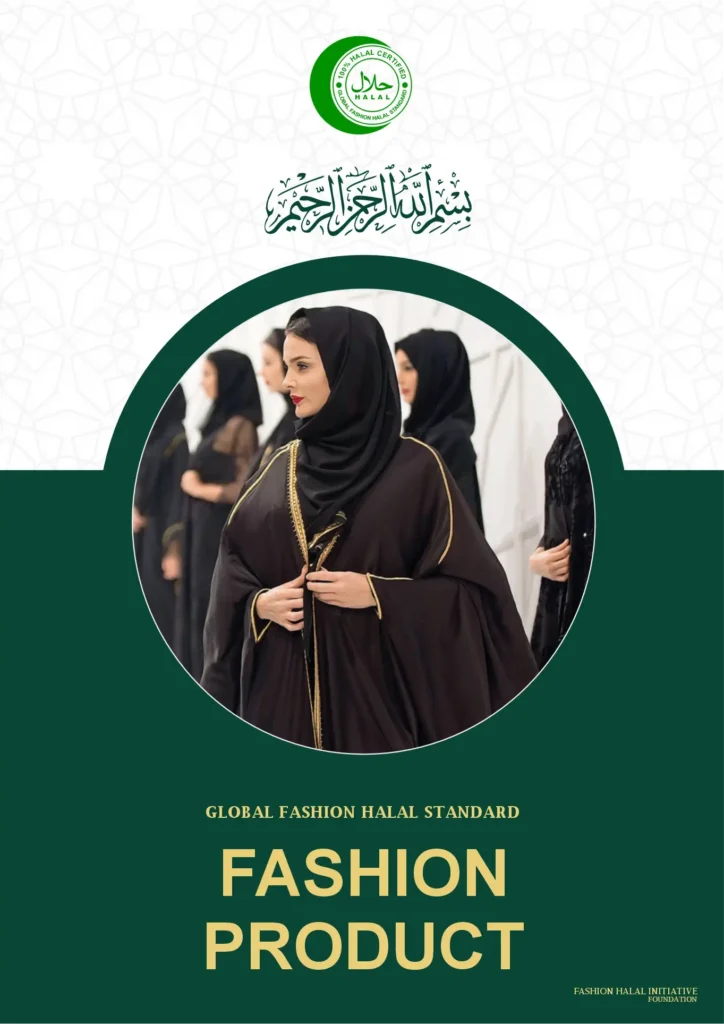
The GFHS framework includes:
- Fashion Ecosystem
Certified products are tested and analyzed against strict criteria that align with Islamic principles. These evaluations include verified raw material traceability, testing for haram substances, and compliance with environmental and halal standards.
The certification process involves:
- Reviewing your product composition.
- Auditing your manufacturing processes for compliance with halal and ethical standards.
- Providing alternative solutions for any non-compliant materials.
- Receiving certification upon meeting the criteria.
[Start Your Certification Journey →]

